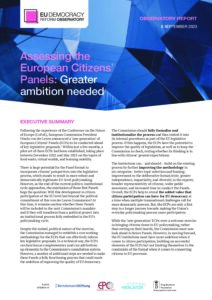More than a year has passed since the Conference on the Future of Europe (CoFoE) concluded its unprecedented deliberative exercise that put citizens front and centre in the discussions on the future of the EU. An inter-institutional effort by the European Commission, the European Parliament, and the Council, the CoFoE brought citizens together in four transnational citizens’ panels to discuss several topics in view of developing a series of recommendations on the future of Europe.
This research shows that the Commission, within only a few months, managed to establish a prototype for citizen engagement on key legislative proposals. These pilot European Citizens’ Panels constitute the backbone of a process that has the potential to provide specific added value to a set of specific objectives, namely, to connect the institutions to citizens and result in more robust EU-level policymaking. Furthermore, involving citizens in EU institutional policy formulation in this way, also in the future, can foster greater democratic legitimacy for EU policymaking, which would improve the quality of EU democracy. But while the concept has been tried and tested in both the CoFoE ECPs, and the pilot ‘new generation’ ECPs, a number of additional steps are required to make these Panels a genuine contribution to EU democracy. To this end, the Commission should develop the ECPs’ design by (1) formalising and institutionalising the Panels and embedding them into the Commission’s (and the EU’s) formal policymaking structure, (2) improving the ECP methodology, and (3) exploring how citizen participation can add value to EU democracy beyond the Commission’s Panels. This paper looks at these three areas in detail and provides concrete recommendations for the future.


